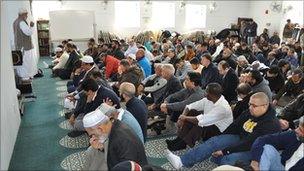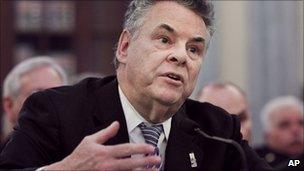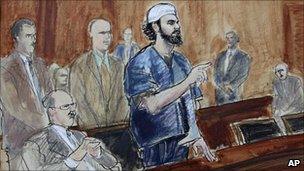US Muslim 'radicalisation' hearings spark unease
- Published

Long Island, New York, is home to about 70,000 Muslims
A series of controversial hearings into the "radicalisation of the American Muslim community" is starting in the US. The Republican congressman holding the hearings says some Muslim leaders are not co-operating enough with the police and FBI. But many US Muslims say they are being unfairly singled out, and some fear the hearings , externalwill only increase Islamophobia in the US.
On Friday evenings, the Islamic Center of Passaic County in northern New Jersey is more like a community centre. There are taekwondo classes and plenty of over-excited children.
But the adults here have something else on their minds.
"I think these hearings have become like a witch-hunt," says Mohammed Elfilali.
He draws a comparison with 1950s America, when Senator Joseph McCarthy made unsubstantiated claims against people he suspected of being Communists, at the height of the Cold War.
It is a comparison that illustrates the depth of feeling on the issue, but one supporters of the hearings dismiss as part of what they say is "hysteria" surrounding a legitimate inquiry.
Real lives
Not far from Passaic County, about 70,000 Muslims live in Long Island, New York. At Friday prayers at one mosque, it is so busy one can hardly move.

Representative Peter King believes some Muslim leaders could do more to prevent radicalisation
Once again, people here are talking about the hearings. The director of the Islamic Center of Long Island, Habeeb Ahmed, says they are already having a negative impact on people in his community.
"This is going to affect real lives. As it is, we're having a lot of problems," he says.
"Ladies who wear hijab, they don't go alone to do shopping, kids are being picked on in school, some neighbours are giving you dirty looks... why [should lawmakers] have a hearing exclusively for Muslims? You should really have a hearing for all the terrorism, all the problems in the country, not just Muslims alone."
The man behind the hearings is Peter King, chairman of the House of Representatives Homeland Security Committee and a New York Republican.
His language has in the past been controversial. Three years ago, he was quoted as saying that "there are too many mosques in this country".
What is more, his critics say, the witnesses that he is calling to appear at the hearings do not represent mainstream Muslims in America.
Mr King argues it is legitimate to investigate Islamist radicalism in the US. But the community aspect to his inquiry - the premise that some Muslim leaders are not co-operating fully with the police and the FBI - is one of its most controversial aspects.
'Homegrown terror'

Shahzad was sentenced to life in prison last year for attempting to detonate a car bomb in Times Square
Recent cases like that of Faisal Shahzad, a Pakistan-born US citizen who tried to detonate a car bomb in New York's Times Square, and Virginia-born army Major Nidal Hasan, charged with fatally shooting 13 people at Fort Hood, Texas, in 2009, have turned the spotlight on home-grown, Islamist extremists in the US.
A 2010 report, external by the Bipartisan Policy Center, entitled Assessing the Terrorist Threat, concluded that extremist groups had changed their tactics, with more of a trend towards recruiting US citizens to carry out smaller, less sophisticated plots.
Dr Bruce Hoffman, one of the report's authors, stated that there was a big problem in that no single government agency was responsible for "deterring radicalisation and terrorist recruitment".
'Terrorists may have found our Achilles heel, we have no way of dealing with this growing problem."
Mr King says his hearings will look at several cases where American Muslim leaders did not pass on information to the security authorities to stop people becoming radicalised.
But a study, external published this year by the Triangle Center on Terrorism and Security at Duke University found that the US Muslims themselves were the largest single source of information to the police in disrupting Muslim-American terror plots (supplying information in 48 out of 120 investigations).
Muslim action
The Passaic County Mosque in New Jersey serves a community of about 9,000 American Muslims.
Mr Elfilali, its outreach director, says he has regular meetings with the county sheriff. He has also met the FBI on several occasions.
"I don't know many people who can claim to have the home number and cell[phone] number of their police chief," he says.
Mr Elfilali says he is as much American as he is Muslim.
''We are here in the United States as part of the American fibre, we want our kids to be raised as American citizens and we don't see any conflict between the two," he says.
Many non-Muslims in America are also opposed to the hearings. Some 80 churches, synagogues and mosques signed a letter sent to Mr King, urging him to call the hearings off.
Sister Jeanne Clark, of Pax Christi Long Island, a Catholic movement aimed at promoting peace, says: "I wanted to put my name to something to say what I believed, that it is wrong to do this. And it's not even good for national security, to divide people.
"We need to build relationships with Muslim people and not make them the target of categorising them as terrorists."
Mr King and fellow Republicans say the hearings will form part of an important debate on national security.
He says the claim that the hearings should focus on all terrorism in America, and not just radicalisation within the American Muslim community, is political correctness.
But for many Muslims, the real fear appears to be that the hearings will increase Islamophobia in the US.
- Published7 March 2011
- Published22 September 2010
- Published16 September 2010